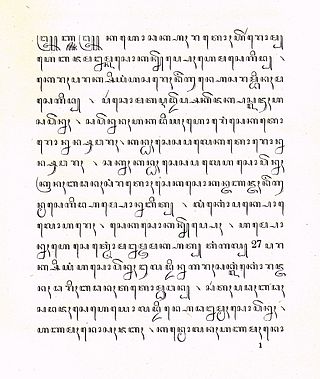Madurese language
Language spoken in Indonesia From Wikipedia, the free encyclopedia
Madurese is a language of the Madurese people, native to the Madura Island and Eastern Java, Indonesia; it is also spoken by migrants to other parts of Indonesia, namely the eastern salient of Java (comprising Pasuruan, Surabaya, Malang, to Banyuwangi), the Masalembu Islands and even some on Kalimantan. It was traditionally written in the Javanese script, but the Latin script and the Pegon script (based on Arabic script) is now more commonly used. The number of speakers, though shrinking, is estimated to be 10-13 million, making it one of the most widely spoken languages in the country. Bawean Madurese, which is a dialect of Madurese, is also spoken by Baweanese descendants in Malaysia and Singapore.
This article's lead section contains information that is not included elsewhere in the article. (April 2021) |
| Madurese | |
|---|---|
| Bhâsa Madhurâ بۤاسا مادورۤا ꦧꦱꦩꦝꦸꦫ | |
| Native to | Indonesia |
| Region | Island of Madura, Sapudi Islands, Java, Singapore and Malaysia (as Boyanese) |
| Ethnicity | |
Native speakers | 10–13.6 million (2008)[1] |
Austronesian
| |
| Dialects | |
| Latin script Carakan script Pegon alphabet | |
| Language codes | |
| ISO 639-2 | mad |
| ISO 639-3 | mad – Standard Madurese |
| Glottolog | madu1247 |
 Areas where Madurese is spoken by a majority of the population
Areas where Madurese is spoken by a significant minority of the population | |

Madurese is a Malayo-Sumbawan language of the Malayo-Polynesian language family, a branch of the larger Austronesian language family. Thus, despite apparent geographic spread, Madurese is more related to Balinese, Malay, Sasak and Sundanese, than it is to Javanese, the language used on the island of Java just across Madura Island.
Links between Bali–Sasak languages and Madurese are more evident with the vernacular form (common form).[citation needed]
Phonology
Summarize
Perspective
Latin letters are given according to the 2008 orthography.[2]
Vowels
Vowels /a/, /ɛ/, /ə/, /ɔ/ and its higher counterparts /ɤ/, /i/, /ɨ/, /u/ are usually in complementary distribution. The last 4 vowels occur after voiced and aspirated consonants, while the first 4 vowels occur elsewhere. Consonants /l/, /r/, and /s/, although by default lower the vowels, are transparent after higher vowels, for example belli /bɨlli/ "to buy" instead of *bellè /bɨllɛ/.[3]
Consonants
| Labial | Dental/ Alveolar |
Retroflex | Palatal | Velar | Glottal | ||
|---|---|---|---|---|---|---|---|
| Nasal | /m/ ꦩ ⟨m⟩ ⟨م⟩ |
/n̪/ ꦤ ⟨n⟩ ⟨ن⟩ |
/ɳ/ ꦟ ⟨ṇ⟩ ⟨ن⟩ |
/ɲ/ ꦚ ⟨ny⟩ ⟨ۑ⟩ |
/ŋ/ ꦔ ⟨ng⟩ ⟨ڠ⟩ |
||
| Plosive | voiceless | /p/ ꦥ ⟨p⟩ ⟨ڤ⟩ |
/t̪/ ꦠ ⟨t⟩ ⟨ت⟩ |
/ʈ/ ꦛ ⟨ṭ⟩ ⟨ڟ⟩ |
/c/ ꦕ ⟨c⟩ ⟨چ⟩ |
/k/ ꦏ ⟨k⟩ ⟨ك⟩ |
/ʔ/ ꦃ ⟨'⟩ ⟨ء⟩ |
| voiced | /b/ ꦧ ⟨b⟩ ⟨ب⟩ |
/d̪/ ꦢ ⟨d⟩ ⟨د⟩ |
/ɖ/ ꦣ ⟨ḍ⟩ ⟨ڊ⟩ |
/ɟ/ ꦗ ⟨j⟩ ⟨ج⟩ |
/ɡ/ ꦒ ⟨g⟩ ⟨ࢴ⟩ |
||
| aspirated | /pʰ/ ꦧ ⟨bh⟩ ⟨ب⟩ |
/t̪ʰ/ ꦢ ⟨dh⟩ ⟨د⟩ |
/ʈʰ/ ꦣ ⟨ḍh⟩ ⟨ڊ⟩ |
/cʰ/ ꦗ ⟨jh⟩ ⟨ج⟩ |
/kʰ/ ꦒ ⟨gh⟩ ⟨ࢴ⟩ |
||
| Fricative | /s/ ꦱ ⟨s⟩ ⟨س⟩ |
/h/ ꦲ ⟨h⟩ ⟨ه⟩ | |||||
| Trill | /r/ ꦫ ⟨r⟩ ⟨ر⟩ |
||||||
| Approximant | /l/ ꦭ ⟨l⟩ ⟨ل⟩ |
/j/ ꦪ ⟨y⟩ ⟨ي⟩ |
/w/ ꦮ ⟨w⟩ ⟨و⟩ |
||||
Madurese has more consonants than its neighboring languages due to it having voiceless unaspirated, voiceless aspirated (traditionally often transcribed as voiced aspirated), and voiced unaspirated. Similar to Javanese, it has a contrast between dental and alveolar (even retroflex) stops.[4][5]
The letters ⟨f⟩, ⟨q⟩, ⟨v⟩, ⟨x⟩, and ⟨z⟩ are used in loanwords.[6]
Morphology
Madurese nouns are not inflected for gender and are pluralized via reduplication. Its basic word order is subject–verb–object. Negation is expressed by putting a negative particle before the verb, adjective or noun phrase. As with other similar languages, there are different negative particles for different kinds of negation.[7]
Common words
| Madurese | Indonesian | English | |
|---|---|---|---|
| Latin | Pèghu | ||
| lakè’ | لاكَيء | laki-laki | male |
| binè’ | بِينَيء | perempuan | female |
| iyâ | إيۤا | iya | yes |
| enja′ | أٓنجاْء | tidak | no |
| aèng [aɛŋ] | أئَيڠ | air | water |
| arè | أرَي | matahari | sun |
| mata | ماتا | mata | eye |
| sengko' | سَيڠكَوء | aku/saya | I/me |
| bâ'na | بۤاءنا | kamu/engkau | you |
Numerals
| Madurese | Indonesian | English | |
|---|---|---|---|
| Latin | Pèghu | ||
| sèttong | سَيتَّوڠ | satu | one |
| duwâ' | دووۤاء | dua | two |
| tello' | تٓلَّوء | tiga | three |
| empa' | اۤمڤاء | empat | four |
| lèma’ | لَيماء | lima | five |
| ennem | اۤنّٓم | enam | six |
| pètto’ | ڤَيتَّوء | tujuh | seven |
| bâllu’ | بۤالّوء | delapan | eight |
| sanga′ | ساڠاء | sembilan | nine |
| sapolo | ساڤَولَو | sepuluh | ten |
Sample text
From Article 1 of the 1948 Universal Declaration of Human Rights.
- Latin
- Sâdhâjâna orèng lahèr mardhika èsarengè dhrâjhât klabân ha'-ha' sè padâ. Sâdhâjâna èparèngè akal sareng nurani bân kodhu areng-sareng akanca kadhi tarètan.
- Aksara Pèghu
- [original research?] ساڊۤاجۤانا عَورَيڠ لاهَير مارڊيكا عَيسارۤڠَي ڊرۤاجۤات کلابۤان هاء۲ سَي پادۤا. ساڊۤاجۤانا عَيڤارَيڠَي أکال سارۤڠ نوراني كَوڊو أرۤڠ-سارۤڠ أكانچا كاڊي تارَيتان.
- Translation
- "All Human Beings are born free and equal in dignity and rights, they are endowed with reason and conscience and should act towards one another in a spirit of brotherhood."
References
Bibliography
Wikiwand - on
Seamless Wikipedia browsing. On steroids.
